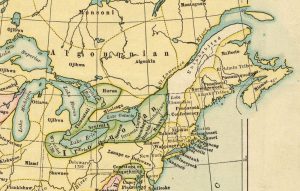Researching Native American ancestry can be difficult for several reasons:
- Multiple legal and other definitions of what constitutes a Native American or American Indian
- Differing levels of legal recognition of tribes; some may be recognized on the state level but not the federal level, some may not be recognized at all
- Necessary record collections scattered among various agencies and locations
- Lack of remote access to necessary records collections
- Problem of DNA testing as it relates to Native American culture (see DNA tab)
Below is a brief overview of available resources for researching native American ancestry, including a look at the issues with DNA testing.
DNA
For several reasons, DNA tests are not always accurate measures of Native American ancestry:
- Home testing kits are not advanced enough to give an accurate result.
- DNA is often less important to Native American cultural identity than community relationships, shared experiences, and long-standing traditions.
- Sovereign tribal nations determine their own criteria for tribal membership; genetics may not be part of the requirements, or they may use different kinds of genetic testing.
- A person may have a Native American ancestor and not have inherited any DNA from them, or inherited such a small amount that it does not show up in test results.
Resources
-
DNA tests stand on shaky ground to define Native American identity - From the National Human Genome Research Institute
-
Native American DNA - From Ancestry.com
-
Tribal Enrollment and Genetic Testing - From the American Indian & Alaska Native Genetics Resource Center
-
Can a DNA test make me Native American? - All My Relations Podcast, Episode #4
BPL Resources
Books and other resources at the BPL related to Native American genealogy research.
Government Resources
Indian Census Rolls
The Indian Census schedules were census rolls that were generally submitted each year from 1885-1940 by the government officials that were in charge of Indian reservations. The information on the rolls will vary by year as the questions changed. Only people who had a formal affiliation with a federally supervised tribe are included in these records.
-
Indian Census of the United States - 1885-1940 - Digitized records on the Internet Archive
-
Indian Census Rolls, 1885-1940 - Information from NARA
Dawes Rolls
Also called: Final Rolls of Citizens and Freedmen of the Five Civilized Tribes in Indian Territory or Dawes Commission of Final Rolls.
Lists of people accepted between 1898 and 1914 by the Dawes Commission as members of the Cherokee, Creek, Choctaw, Chickasaw, and Seminole tribes.
-
Dawes Rolls - Information from NARA
More Records and Guides
-
American Indian Records in the National Archives - From the National Archives and Records Administration (NARA)
-
Bureau of Indian Affairs Photographs Finding Aid - Includes over 18,000 photographs from the Bureau of Indian Affairs (Record Group 75)
-
U.S. Department of the Interior, Indian Affairs - Genealogy - Provides links to guides and resources
-
U.S. Department of the Interior - Trace Indian Ancestry - Provides information about how to trace Native American ancestry
-
Commonwealth of Massachusetts' Commission on Indian Affairs - Information about and links to various resources
-
The CCC Indian Division - Article from Prologue Magazine, formerly published by NARA
Further Reading
-
Native American Genealogy Is Still Problematic - From FamilySearch.org
-
Genealogy Research - Archived page from the National Tribal Justice Resource Center
-
Researching Native American Ancestors - From Ancestry.com
-
Trace Your Native American Roots - From Archives.com
-
Tracing Native Ancestry: A Guide to Responding to Inquiries - Archived page from the National Indian Child Welfare Association
-
Tracing Your Indian Roots - Archived page from Oklahoma Indian Legal Services, Inc.
Websites
-
Mashpee Wampanoag Tribe- Enrollment - Information about enrolling in the Mashpee Wampanoag Tribe
-
National Conference of State Legislatures- Federal and State Recognized Tribes - Listings of tribes recognized on the Federal and State level.
-
Native Nations of New England - Research guide from the New England Historic Genealogical Society
-
Our Mother Tongues- Wôpanâak Language Reclamation Project - Information about efforts of the Wampanoag to learn their native language.
-
The Wampanoag Tribe of Gay Head (Aquinnah) - Official website



Add a comment to: Researching Native American Heritage